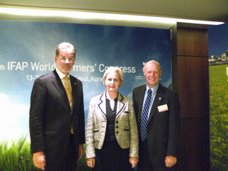In El Salvador the cooperative dynamics in the Confederación de Federaciones de la Reforma Agraria Salvadoreña CONFRAS (confederation) were strengthened and CONFRAS was enabled to contribute to farm diversification and marketing, resulting in increased income for farmers, including women, and despite negative external trends. There is still need for continuous attention and awareness creation for farmers to produce according to market demand. Also, despite high female membership, the participation of young people and women in managerial roles remains relatively low.
“The support involved 11 cooperatives and 5 women’s committees (representing in total 328 women and 388 men). Functional and organisational aspects of the cooperatives and participating women’s committees were strengthened. 11 cooperatives have improved their management (for example adequate accounting and improved participation in general assembly’s has increased by 84%). The gender aspect has been very central during the organisational strengthening. Presently 27% of the management positions are taken by women in the cooperatives, compared to 10% at the start, with an impact on further strategies and policies for gender in the cooperatives. Apart from the organisational strengthening of the different cooperatives, CONFRAS has strengthened its capacity to defend the rights of the cooperative members and has supported the advocacy capacity of its grass root members. These organisational and advocacy efforts have been very complementary to support farmers for product diversification and collective marketing. A result of 140 ha with 23 new crops can be registered. 87% of the members market their produce together (of which 60% women). In 2008, 358 producers increased the value of their farm plots by at least 40%. 67% of the total population obtained higher incomes and 34% of the participating household met their basic food needs, made small investments in irrigation or purchased agricultural supplies. This impact was realised against a negative external trend of flood, which caused 15% loss of production. Also the price of agricultural inputs generally increased with 100% in the region. There are remaining challenges. It asks continuous efforts to overcome lack of trust and to change the attitude of ‘selling what is produced’ towards ‘producing what can be sold’. Also, despite improvements, participation of young people and women in managerial roles remains low, and needs further encouragement.”
Wednesday, November 19, 2008
Subscribe to:
Post Comments (Atom)
Check these interesting contributions from other sites & blogs
- On Farmers Organization in Egypt
- Law on farmers Organizations in China
- Interview with FAO officials on Farmers Organizations
- Farmers use mobile phones
- comment of Kees Blokland on anti-CAP campaigning
- Poverty & growth blog of the World Bank
- Gapminder statistics visualized
- Guide for implementing ICT projects - iCommons december 2006
- Africa: tools of liberalisation - Patricia Daniel, University of Wolverhampton, England
- Business and the rural poor - Harvard Business School
- Profiling Asian Farmers Association members - Jan 4th, 2007
- Fiji Times report on AgriCord grants to Sugar Farmers - January 04, 2007
- Increasing Impact - marrying micro-credit and micro-insurance - The disconfort Zone, january 4th, 2007
- Programs that Fight Poverty - Institute for Advanced Technologies in Global Resilience - November 17, 2006
- University of Chicago Press Journals reports on GMOs - January 25, 2007
- Biotech crops to help reduce poverty - Kauser A Malik, in the Daily Times (Pakistan) January 25, 2007
- Why does China grow so fast - Michael Spence The Wall Street Journal 23 january 2007






No comments:
Post a Comment